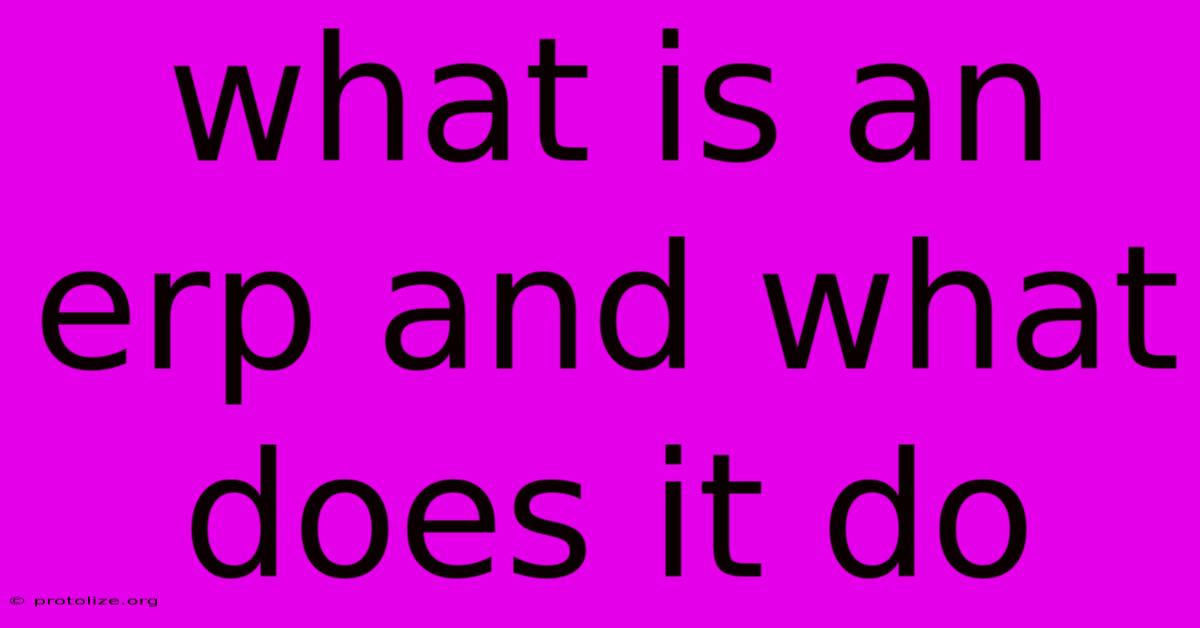What Is An Erp And What Does It Do

Discover more detailed and exciting information on our website. Click the link below to start your adventure: Visit Best Website mr.cleine.com. Don't miss out!
Table of Contents
What is an ERP and What Does it Do?
Enterprise Resource Planning (ERP) systems are the backbone of many successful modern businesses. But what exactly is an ERP, and what does it do? This comprehensive guide will break down the essentials, explaining ERP's functionality and its impact on various business operations.
Understanding Enterprise Resource Planning (ERP)
At its core, an ERP system is a centralized software solution designed to integrate and streamline all facets of a business's operations. Think of it as a single source of truth, connecting disparate departments and processes under one umbrella. Instead of relying on isolated systems for finance, human resources, supply chain, and customer relationship management (CRM), an ERP system unites them, facilitating efficient data flow and improved decision-making.
Key Features of an ERP System:
-
Integrated Modules: ERP systems are modular, offering a range of specialized functionalities catering to different business areas. These modules often include:
- Financial Management: Accounting, budgeting, financial reporting, and forecasting.
- Human Capital Management (HCM): Payroll, recruitment, employee management, and performance tracking.
- Supply Chain Management (SCM): Procurement, inventory management, production planning, and distribution.
- Customer Relationship Management (CRM): Sales, marketing, customer service, and support.
- Manufacturing: Production planning, scheduling, and quality control.
-
Centralized Database: A crucial element is the centralized database. This shared repository ensures data consistency and accuracy, eliminating data silos and preventing discrepancies between different departments.
-
Real-time Data: ERP systems provide real-time visibility into business operations. This means managers can access up-to-the-minute data, enabling faster and more informed decisions.
-
Improved Collaboration: By unifying information, ERPs foster better collaboration between departments. This streamlined communication minimizes errors and delays.
What Does an ERP System Do?
The impact of an ERP system spans numerous areas, ultimately contributing to increased efficiency and profitability. Here's a breakdown of its key functions:
1. Automating Business Processes:
An ERP system automates repetitive tasks, freeing up employees to focus on higher-value activities. This automation extends to areas like:
- Invoice processing: Automating invoice creation, tracking, and payment.
- Order fulfillment: Streamlining the order-to-cash cycle.
- Inventory management: Optimizing stock levels and reducing waste.
- Payroll processing: Automating payroll calculations and tax reporting.
2. Enhancing Data Visibility and Reporting:
The centralized database allows for comprehensive reporting and analysis. This improved data visibility helps businesses:
- Identify trends and patterns: Gaining insights into sales, customer behavior, and operational efficiency.
- Make data-driven decisions: Using accurate and timely data to improve strategic planning.
- Track key performance indicators (KPIs): Monitoring progress towards business objectives.
3. Improving Operational Efficiency:
By integrating various departments, an ERP system streamlines workflows and reduces redundancies, leading to:
- Faster processing times: Accelerating order fulfillment, invoice processing, and other key processes.
- Reduced errors: Minimizing manual data entry and improving data accuracy.
- Increased productivity: Freeing up employees to focus on strategic tasks.
4. Better Collaboration and Communication:
The shared database and integrated modules facilitate seamless communication between departments, fostering:
- Improved teamwork: Breaking down departmental silos and improving cross-functional collaboration.
- Enhanced customer service: Providing a unified view of customer information across different departments.
- Faster response times: Addressing customer inquiries and resolving issues efficiently.
Choosing the Right ERP System
Selecting an ERP system requires careful consideration of your business's specific needs and requirements. Factors to consider include:
- Business size and complexity: The system should scale to your current and future needs.
- Industry-specific features: Some ERPs cater to specific industries, offering specialized functionalities.
- Budget: ERP systems can vary significantly in cost.
- Integration capabilities: Ensure the system integrates with existing software and hardware.
- Vendor support and training: Choose a vendor that provides adequate support and training.
In Conclusion:
An ERP system is a powerful tool that can transform a business by integrating its various operations, streamlining processes, and providing real-time data insights. While the initial investment may be substantial, the long-term benefits of increased efficiency, improved decision-making, and enhanced profitability often outweigh the costs. Understanding the capabilities and benefits of an ERP system is crucial for any business looking to optimize its operations and achieve sustainable growth.

Thank you for visiting our website wich cover about What Is An Erp And What Does It Do. We hope the information provided has been useful to you. Feel free to contact us if you have any questions or need further assistance. See you next time and dont miss to bookmark.
Featured Posts
-
I Os 18 2 New Apple Features
Dec 13, 2024
-
Perth Drake Tour Extended
Dec 13, 2024
-
Worcester 30i Erp Plate Heat Exchanger
Dec 13, 2024
-
Erp Uat Checklist
Dec 13, 2024
-
Erp Software Affiliate
Dec 13, 2024
